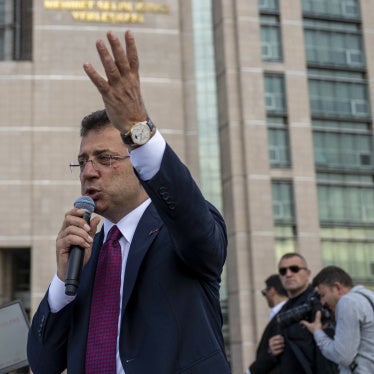Vilnius’ beautiful old town is alive with flags and symbols of the European Union ahead of the ‘Eastern Partnership’ summit starting Thursday, but the real drama has been played out far from the Lithuanian capital.
For weeks international media attention has focussed on Ukraine, one of the six countries – alongside Georgia, Moldova, Azerbaijan, Armenia and Belarus – in ‘partnership’ with the EU to deepen political and economic integration. Kiev’s manoeuvring, and the roles played by the EU and Russia, have sparked headlines about a return to Cold War politics.
The protests in Ukraine since the government’s decision to pause negotiations on an Association Agreement (AA) with the EU, underline that the issues at stake, including improvements in the rule of law and human rights, are vital to ordinary people.
There will be plenty of handshakes in Vilnius this week, and the agreements to be initialled or signed, if linked to the implementation of political reforms, would mark progress on some key human rights issues flagged by the EU.
It is important, however for EU institutions and EU member states to focus on the time after the summiteers leave Lithuania: To recognise that Vilnius is intended as a stepping stone to closer ties with some of the six countries, not an end in itself.
From the outset the EU’s basic approach in the Eastern Partnership (EaP) has been that each country’s pace of democratic reform and commitment to shared values with the EU, including on human rights and the rule of law, would determine the intensity of co-operation.
This principled, consistent approach needs to continue. Those that have made progress – such as Georgia and Moldova – should be subject to the same high standards, benchmarks, and monitoring as before the summit. Equally, the EU should not lose focus on the pressing human rights issues in the EaP countries – Armenia, Azerbaijan and Belarus - where no deals on significantly deeper relations are expected this week.
Such consistency on standards lies at the heart of the EU’s offering to its eastern partners, and would be an important signal to civil society in these countries that the EU’s commitment goes far beyond summit agreements.
The EU will be watching closely the political fallout triggered by Kiev’s decision on the AA. Most immediately, it is vital that the authorities allow peaceful protests, and avoid using unnecessary force. Police have on occasion used teargas and batons to break up protests.
Longer term, the issues that dominated the EaP negotiations with Kiev, such as the use of selective justice, must remain important, but the EU should use the new post-Vilnius phase to also raise other pressing human rights issues with the Ukrainian authorities. These include government restrictions on media freedom, discrimination against the lesbian, gay, bisexual and transgender (LGBT) community, failure to implement regulations for effective palliative care, and abuses linked to Ukraine’s deeply flawed asylum system.
Both Belarus and Azerbaijan have terrible human rights records. The EU has been correct not to seek to significantly deepen ties with Belarus. The EU’s “more for more” policy – more integration for more reforms – has not been fully tested with Azerbaijan. Its government has performed badly on delivering human rights changes needed for an AA to go forward, and Baku was the first to back away from such an agreement. This does not mean that, for either country, human rights issues should fall off the EU’s radar or be shunted aside for other energy or geo-political related priorities.
Belarus remains highly repressive, with the authorities suppressing virtually all dissent and severely impeding freedoms of association and assembly. Until its record markedly improves, the EU has good reason to maintain its sanctions and press for an end to abuses.
The Azerbaijan government has carried out an unprecedented human rights crackdown over the last year and has said it is only interested in talking to the EU about limited relations that would eschew human rights conditions. But the EU’s core focus should remain on linking deeper relations to clear reforms on human rights and the rule of law.
Armenia has opted out of initialling an AA for the time being, by entering into a customs union promoted by Russia. Yet human rights abuses continue, such as violence against peaceful protesters and police brutality. Civil society also needs support following the government’s U-turn. These are not issues the EU can easily ignore.
Georgia poses a different challenge. It has made impressive progress, highlighted most clearly in its peaceful transition of power last month. Yet the initialling of its AA this week should make the beginning of a new – no less rigorous - engagement. On the to-do list? Speedier and more transparent investigations into torture and ill-treatment in police custody, tackling concerns over selective justice, and ending discrimination against LGBT groups.
EU leaders should realise that much has been achieved with the EaP and resist any temptation to lower standards to win back governments turning away from Europe. A principled, consistent approach on democracy and human rights issues is the best guarantee of more progress in future.
Hugh Williamson is director of the Europe and Central Asia Division at Human Rights Watch.








